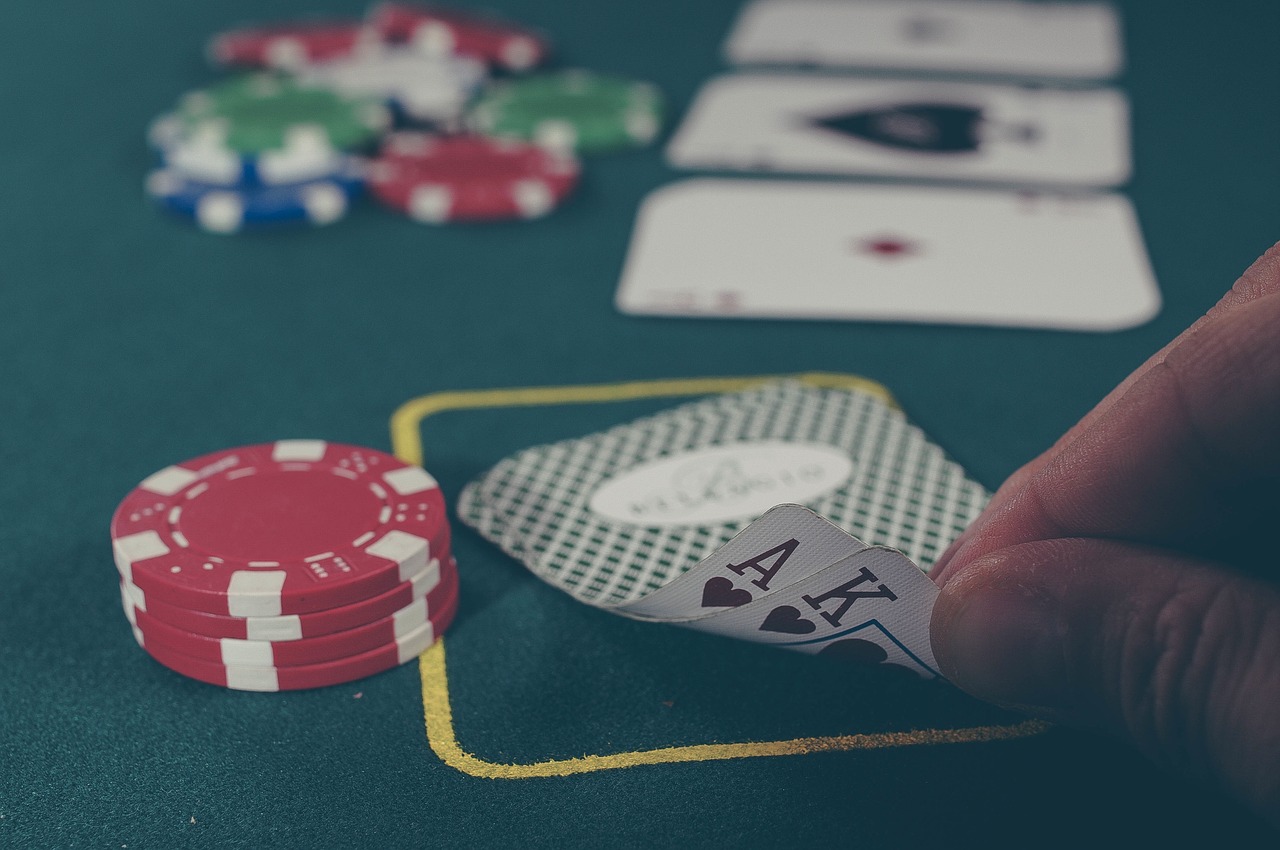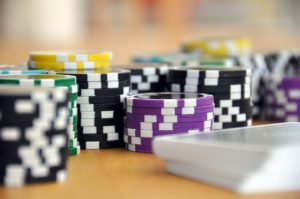
|
|
Someone struggling with an addiction to drugs or alcohol experiences side effects of their disease very inwardly. Certain side effects can sometimes be more obvious on the outside like with skin sores on someone who is struggling with a chemical dependence on methamphetamine, but most of the time the person struggles with their own demons. However, compulsive gambling addiction is a different story. While much of the mechanics of substance addiction occur behind the scenes, in the interactions of biology and chemistry within a person’s body, compulsive gambling addiction is a behavior that is acted out and experienced outside of the person and because of this, there are more clearly affecting facts that one can observe from the outside than with most other kinds of addiction disorders.
Profiting from Addiction
 It is arguable that there is no other form of addiction as exploitable as that of gambling. If someone wanted proof that gambling is used as a way for others to exploit people’s compulsive gambling addiction disease all they would need to do is look at the gambling industry for proof. The very fact that casinos exist, and that lotteries are a common place practice shows the proof that there is a ton of money to be made from exploiting a person’s disease by offering them an easy way to place bets on some very high stakes.
It is arguable that there is no other form of addiction as exploitable as that of gambling. If someone wanted proof that gambling is used as a way for others to exploit people’s compulsive gambling addiction disease all they would need to do is look at the gambling industry for proof. The very fact that casinos exist, and that lotteries are a common place practice shows the proof that there is a ton of money to be made from exploiting a person’s disease by offering them an easy way to place bets on some very high stakes.
Some people gamble for the thrill and competition of winning against the house. That kind of anticipation is more compelling for them than making large sums of money. Still other people suffering from compulsive gambling disorder obsessively dream of one single life changing jackpot. But either way, after a long enough period of time spent gambling, the house comes out ahead, able to show enormous profits and the person struggling with compulsive gambling disorder at best never ends up ahead, and at worst loses everything they have and love.
 A lot of people with the addiction believe that they hold a natural sort of insight in to the way the gambling system works. They believe that this insight allows them the ability to win bigger wins, cash in more chips with the special predictive power they believe lies within them. A little known fact, however, is that casinos and lotteries both have to run their businesses in line with a strict law regarding the probabilities and payouts of the institutions particular kinds of gambling devices. If anyone playing their games should happen to predict the outcomes of a game in this way, it would not only bankrupt the owners of the gambling device, it would also land them in quite a bit of trouble with the law.
A lot of people with the addiction believe that they hold a natural sort of insight in to the way the gambling system works. They believe that this insight allows them the ability to win bigger wins, cash in more chips with the special predictive power they believe lies within them. A little known fact, however, is that casinos and lotteries both have to run their businesses in line with a strict law regarding the probabilities and payouts of the institutions particular kinds of gambling devices. If anyone playing their games should happen to predict the outcomes of a game in this way, it would not only bankrupt the owners of the gambling device, it would also land them in quite a bit of trouble with the law.
The Sunk Cost Fallacy
Many of these people who suffer from compulsive gambling disorder struggle in particular with the notion of the sunk cost fallacy – the wrong belief that since that person has paid into something, in this case a high stakes gambling game, that person should keep paying in to it no matter the result in order to recuperate the cost of the initial investment. A person struggling with compulsive gambling disorder might think of a slot machine being near to a big jackpot but in reality one of the restrictions that casinos must abide by is that there be no pattern or logic at all to the way the machines work. They must be completely random. Each instance of gambling is completely unique, a random chance that the person has to either win or lose. And the odds are never in the gambler’s favor. The game has the same odds of hitting the jackpot every time they play or spin. Some people gambling at casinos may feel that they are owed the money they put into the game back, even if they don’t get a big win. But the truth is that the money you’ve gambled does not come back to you. Casinos have to turn a profit so you can be sure you are always more likely to lose than to win.
Despite the persistent harm and distrust compulsive gambling disorder can cause in the lives of those who are in the grip of this kind of addiction, someone suffering from compulsive gambling addiction will always go back to their craps table, or blackjack game or slot machine, just like someone with a substance addiction will always go back to their IPA, or their Whisky, their Vicodin, or their cocaine. The alcoholic will always want a drink and the heroin addict will always want to use, even though they know it is killing them. Addiction is an unforgiving disease. Sometimes the anticipation of a win all on its own is just as addictive as the win itself.
When a friend or family member suffers from a gambling addiction it can take some time to fully understand their condition. To someone who is not addicted it seems like very expensive entertainment and it’s easy to rationalize choosing something else to do with one’s time and money. Someone may scoff at a person addicted to gambling, and think that they are just making bad decisions with their money or trying to get easy money. While it is very easy to judge their lack of discernment, it is vital that we resist the urge to judge and instead seek to understand the people in our lives suffering from compulsive gambling addiction – their side effects of the disorder, and their condition as a whole – as they experience it.
Sympathy for a Gambler
 The reason so many people look at those suffering from this disorder with anything less than understanding and compassion is because most of the time it’s not clear that the disorder is compulsive. Because they aren’t consuming an intoxicating substance, because there is no chemical component, it’s hard for anyone not suffering from the disorder to be able to understand the compulsion to play the odds. Most people can relate to ‘needing caffeine’ or ‘craving chocolate’ and make the jump to feeling driven to drugs or alcohol. But because it feels like the decision to gamble is such a voluntary action it can make it difficult to relate to those internal instinctual drivers.
The reason so many people look at those suffering from this disorder with anything less than understanding and compassion is because most of the time it’s not clear that the disorder is compulsive. Because they aren’t consuming an intoxicating substance, because there is no chemical component, it’s hard for anyone not suffering from the disorder to be able to understand the compulsion to play the odds. Most people can relate to ‘needing caffeine’ or ‘craving chocolate’ and make the jump to feeling driven to drugs or alcohol. But because it feels like the decision to gamble is such a voluntary action it can make it difficult to relate to those internal instinctual drivers.
In reality though it is the exact same processes in the brain that drives both an addiction to drugs or alcohol and a behavioral addiction like compulsive gambling disorder. Any kind of addictive disorder causes the brain’s reward seeking drive to become hyper attuned to a specific stimulus. It does this to the point that it requires that same stimulus to produce certain types of neurotransmitters. This kind of stimulus dependency is what drives addiction, not the source of the stimulus. In this way, gambling addiction is every bit as much of a chemical dependence issue as any substance abuse addiction.
The Three Elements of Gambling
To start with a simple definition, gambling, no matter how abstracted the mechanics are, has three consistent elements: consideration, chance and prize.
Consideration – The consideration is the understanding and acceptance of the rules of the game from the outset and the willingness to put something of worth on the line. It is an implicit contract between two parties who agree to some amount of risk.
Chance – The chance is the determination of who benefits from the risk and who does not is determined by some form of probability – there is a chance for each party to walk away a winner or a loser.
The prize – The prize is the desired result – some outcome that the individual regards as more valuable than their initial stake.
It is very easy to see these elements in classical casino gambling. They are obvious, even stereotypical. The slot machine has rules and the offered prizes written on to it or accessible to the player via a visible screen. The player may read and accept them and pay the cost to play as consideration. The slot machine then uses a random number generator to produce an outcome – the player either loses their stake, or wins one of the stated prizes. It’s the same with games like Craps or Roulette – a set of agreed upon rules signified by an investment from the player, then a source of randomness that determines the outcome.
Illusion of Control is the Game Changer
The gambling waters first become murky with games like Blackjack and Poker. With these different games there is a random element in the cards, but there’s a sense that one can become “good” at these games, that they’re no longer just blind chance, that they can master some kind of strategy to make them win more than they lose. Because the player makes a series of different choices in the course of a single game, that all play a part in determining the final outcome, it creates an illusion of control for the person playing the game.
In spite of these personal choices made by the player, these are still gambling games, and wouldn’t be offered in the casinos if the end result wasn’t a substantial profit for the house. In these types of games, the end game is still ultimately up to chance, even when the player plays as optimally as is possible. Another way to say this is that there are definitely wrong choices, which result in the player lowering their probability of winning, but even when the player makes all the right choices, they are still no better off than if they were playing Craps or Roulette.
Another interesting wall that the industry likes to hide gambling behind is to make the actual gambling a collective action. In games like Bingo and Keno, individuals all make their own unique consideration, but their initial bets are pooled to create a larger prize to be given to the winner, after the house takes their cut of the pot, of course. The random element is basically the same as with roulette or craps, but the result is an prize many times bigger than the amount of the original consideration made by the player.
Speculation Games
 Gambling has its origins in the paleolithic era – it is older than written language and most forms of agriculture. It is not a new problem at all, though in the modern era it takes a variety of forms that can disguise its nature. There are many modern forms of gaming that occupy the hazy gray areas at the edge of gambling, and there are many avenues for speculation that while they may seem completely removed from traditional forms of gambling, these forms of gaming still have all the elements to foster a true compulsive gambling disorder.
Gambling has its origins in the paleolithic era – it is older than written language and most forms of agriculture. It is not a new problem at all, though in the modern era it takes a variety of forms that can disguise its nature. There are many modern forms of gaming that occupy the hazy gray areas at the edge of gambling, and there are many avenues for speculation that while they may seem completely removed from traditional forms of gambling, these forms of gaming still have all the elements to foster a true compulsive gambling disorder.
A relatively new kind of game that follows this model is fantasy football. When played for real money, it is effectively the same schema as Bingo, though it is stretched over a season of a sport instead of a series of balls tumbling from a cage. This stretching over a season may seem like it gives a lesser chance of addiction but it is actually feeding the need for deep anticipation that some players may enjoy. This type of game is called a speculation game, because you’re betting on events that the gamblers can research and feel like they have insider knowledge of, but at the end of the day there are so many factors at work that the result of games like fantasy football are still probabilistic.
Sports betting as well as betting at a racetrack both fall under the category of speculation games. No matter how much statistical, anecdotal, or mystical knowledge the person suffering from compulsive gambling disorder can collect about the outcome, the determination still comes down to random chance. And again, when you are gambling in a scenario where one of the parties is a business, the math of the consideration will be far weighted so that the outcomes of the game will always favor the house in the long run.
Speculation betting is one of the kinds of gambling where the framework of the bet gets the haziest. We wouldn’t normally think of a hobby like collecting stamps as being gambling, but all the elements are there: Consideration of the current markets and general trends, and a decision to “buy in” on a proposition by purchasing an object for the collection, then over time the valuation of that object rises or falls based on any number of incalculable functionally random factors that are out of the player, or collector’s control. Eventually the reward is determined by whether the timing and choice of the investment were worth it in the end.
And Speaking of Investment
 No discussion of speculative gambling would be complete without considering the immense betting markets that are so popular that they get covered sometimes multiple times a day and consistently on the evening news. The Stock Market is one giant distributed speculation gambling enterprise. This is particularly worth thinking about because there are types of behaviors like this that can definitely lead to a gambling disorder but are much more difficult to recognize because they are masked by socially accepted norms.
No discussion of speculative gambling would be complete without considering the immense betting markets that are so popular that they get covered sometimes multiple times a day and consistently on the evening news. The Stock Market is one giant distributed speculation gambling enterprise. This is particularly worth thinking about because there are types of behaviors like this that can definitely lead to a gambling disorder but are much more difficult to recognize because they are masked by socially accepted norms.
If an individual lost ten thousand dollars playing bingo every night, someone would almost definitely refer them for treatment of a compulsive gambling addiction, but if that same amount of money was lost due to a series of poor stock management choices, the idea of treatment would likely never come up. That is not to say that all investment is bad or a result of an unhealthy relationship with gambling, just to note that to someone who is already struggling with a propensity towards gambling, the consideration, chance and prize incentives are all there. The behaviors and mental patterns that result in a compulsive gambling disorder can be triggered and do occur outside of a casino setting and in such a case, the disorder is much more likely to go undiagnosed, with the person suffering from the compulsive gambling disorder receiving no gambling addiction help.
Treatment for Compulsive Gambling Disorder at A Gambling Addiction Treatment Center
The opportunity to gamble is everywhere. This kind of accessibility means that it is very difficult for someone struggling with compulsive gambling disorder to avoid being triggered and then lured in to some type of gambling game, even one that feels innocuous. Compulsive gambling addiction disorder, just like substance abuse, is something a person needs help to recover from. It won’t be exactly like it would be if someone was suffering from drug or alcohol addiction. Drug detox is obviously not quite what the person struggling with a compulsive gambling addiction needs. But there is gambling addiction help to be had.
The important thing to remember when trying to support anyone in your life who suffers from addiction, is to have compassion for the person struggling, especially if they are actively seeking out support and help for their addiction, be it an addiction to a drug or alcohol, or a compulsive gambling addiction.
Even if you don’t fully comprehend or identify with their struggles, or maybe you can’t even conceive of what good motivations they could possibly have, the addiction from which they suffer and the side effects related are very real and often devastating to them. The person is likely aware of how irrational their actions seem and are. The amount of shame that comes with almost any kind of addiction, and especially with the consequences of their choices, and likely heartbroken that anyone else is affected by their disease. It is important to try to compassionately listen to their experiences and not dismiss them out of hand. Everyone’s brain works in different ways, and the sooner you accept that your loved one faces struggles that you do not, the better you can support them in their rehabilitation from the disease
To help your loved one go through the hard work of recovery and get gambling addiction help, talk to us about attending a gambling addiction rehab center with FHE Health.






